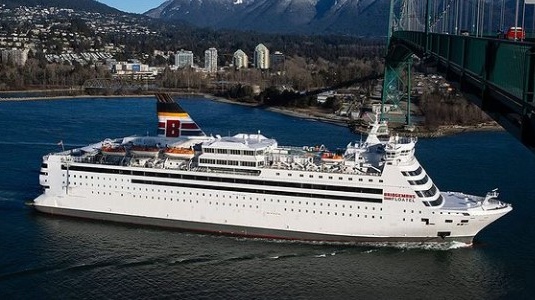Floating hotel ship arrives in Nanaimo ahead of WoodFibre LNG construction project
 The MV Isabelle floating hotel under the Lions Gate Bridge in Vancouver, B.C. (Bridgemans Services Group)
The MV Isabelle floating hotel under the Lions Gate Bridge in Vancouver, B.C. (Bridgemans Services Group)
A massive hotel ship that previously accommodated Ukrainian refugees in Estonia has arrived on Vancouver Island as it prepares to house more than 600 workers for a natural gas construction project near Squamish, B.C.
The 154-metre MV Isabelle, a so-called "floatel," or floating hotel, arrived at the Port of Nanaimo on Wednesday evening. The ship contains 652 cabins that will house workers building the Woodfibre LNG project starting this spring.
The Vancouver-based Bridgemans Services Group, which owns the ship and three similar vessels, says the MV Isabelle was outfitted in North Vancouver last month with lockers, games tables and equipment for an 8,000-square-foot onboard fitness facility.
Woodfibre LNG selected the ship in November, saying in a statement that the vessel would provide the most comfortable and sustainable accommodations for the natural gas project's non-local workforce.
"From the start, it's been a priority to make sure the construction of the Woodfibre LNG facility has as little impact on Squamish as possible," Woodfibre LNG president Christine Kennedy said in the statement.
Bridgemans acquired the ship last July and registered it as a Canadian vessel on Jan. 31, according to Transport Canada records. Prior to that, the ship served as a ferry between Latvia and Sweden before it was temporarily repurposed to house people fleeing the war in Ukraine.
Port of Nanaimo spokesperson Andrea Thomas says the Canadian-flagged vessel's arrival in Nanaimo as a staging ground before its eventual departure for Squamish underscores the port's "commitment to leveraging Canadian resources and expertise."
"This vessel represents a pivotal asset in providing comfortable and accessible accommodation for the workforce involved in one of the region's most significant projects," Thomas added.
The ship has sewage and water treatment systems, industrial heat pumps, and the ability to run on shore power from the BC Hydro electricity grid, according to Bridgemans.
Once the vessel is docked at the project site, the company says it will have a crew on board at all times to inspect the ship and ensure fire, water and other safety systems meet Canadian regulations.
With files from The Canadian Press
CTVNews.ca Top Stories

'The world is too messy for bureaucratic hurdles': Canada still bars Afghanistan aid
Ottawa has plans to finally stop blocking Canadian development aid to Afghanistan this year.
Cisco reveals security breach, warns of state-sponsored spy campaign
State-sponsored actors targeted security devices used by governments around the world, according to technology firm Cisco Systems, which said the network devices are coveted intrusion points by spies.
More than 115 cases of eye damage reported in Ontario after solar eclipse
More than 115 people who viewed the solar eclipse in Ontario earlier this month experienced eye damage after the event, according to eye doctors in the province.
Toxic testing standoff: Family leaves house over air quality
A Sherwood Park family says their new house is uninhabitable. The McNaughton's say they were forced to leave the house after living there for only a week because contaminants inside made it difficult to breathe.
B.C. seeks ban on public drug use, dialing back decriminalization
The B.C. NDP has asked the federal government to recriminalize public drug use, marking a major shift in the province's approach to addressing the deadly overdose crisis.
Decoy bear used to catch man who illegally killed a grizzly, B.C. conservation officers say
A man has been handed a lengthy hunting ban and fined thousands of dollars for illegally killing a grizzly bear, B.C. conservation officers say.
OPP responds to apparent video of officer supporting anti-Trudeau government protestors
The Ontario Provincial Police (OPP) says it's investigating an interaction between a uniformed officer and anti-Trudeau government protestors after a video circulated on social media.
Loud boom in Hamilton caused by propane tank, police say
A loud explosion was heard across Hamilton on Friday after a propane tank was accidentally destroyed and detonated at a local scrap metal yard, police say.
An emergency slide falls off a Delta Air Lines plane, forcing pilots to return to JFK in New York
An emergency slide fell off a Delta Air Lines jetliner shortly after takeoff Friday from New York, and pilots who felt a vibration in the plane circled back to land safely at JFK Airport.
































